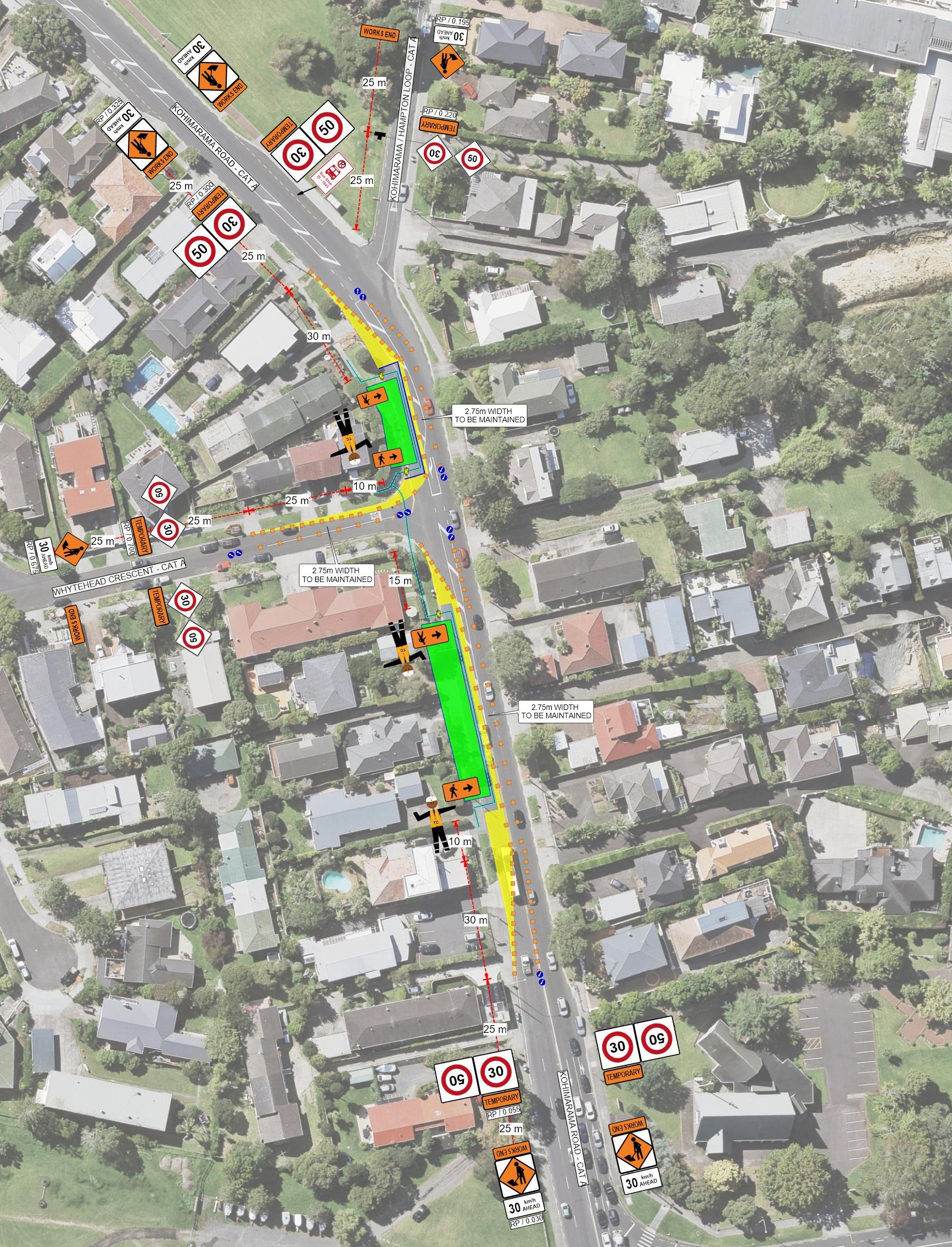TRAFFIC MANAGEMENT PLAN
We offer expert traffic management planning services that cater to the specific requirements of each project. We work closely with our clients to design comprehensive traffic management plans that meet Waka Kotahi NZTA and local Councils regulations, ensuring smooth and safe traffic flow during construction, events, or roadworks. Our plans focus on minimizing disruption and maximizing safety for both workers and road users.
RISK BASE TRAFFIC MANAGEMENT PLAN (RSTMP)
A Risk-Based Traffic Management Plan ensures that the risks associated with roadworks, events, or disruptions are minimized. By systematically identifying and managing risks, the TMP ensures safety for both road users and workers. The NZGTTM provides detailed guidance on how to approach and implement such plans, focusing on effective risk management, compliance, and ongoing monitoring.
SITE SPACIFIC TRAFFIC MANAGEMENT PLAN (SSTMP)
A Site-Specific Traffic Management Plan (SSTMP) ensures that traffic, pedestrian, and cyclist safety is maintained during a specific project or event. By addressing the unique risks and requirements of the site, the SSTMP provides a comprehensive and tailored approach to traffic management. Proper planning, clear communication, and ongoing monitoring are key to ensuring the success of the plan and minimizing disruption to the public and the surrounding community.
GENERIC TRAFFIC MANAGEMENT PLAN (GTMP)
The Generic Traffic Management Plan (GTMP) is a practical and efficient solution for organizations, especially utilities companies, that regularly perform low-risk, high-volume tasks or emergency callouts. It allows for fast and streamlined deployment of traffic management measures, ensuring that roadworks, maintenance, and emergency repairs are carried out with minimal disruption to traffic and pedestrians while maintaining safety standards. By standardizing traffic management practices for routine work, the GTMP enables quick responses to emergencies and the smooth completion of projects, all while ensuring compliance with road safety regulations.
Moreover, Global Permits or Generic TMPs are typically issued for a period ranging from 6 months to 1 year, depending on the scope of work and the approval process. This time frame allows organizations to carry out routine and emergency works within a specified area without needing to submit new plans for each individual task. The flexibility of these permits supports ongoing operations, ensuring that work can continue efficiently with fewer administrative delays.
EVENT TRAFFIC MANAGEMENT PLAN (ETMP)
Are you planning an event that involves the use of road corridors and public spaces? A well-designed Traffic Management Plan (TMP) is essential to ensure the safety of all participants, road users, and pedestrians. Whether it’s a parade, festival, concert, or sporting event, we are here to help you create a comprehensive ETMP that meets all safety standards and regulatory requirements. Our expert team will assess the event’s specific needs, design an effective traffic flow plan, and ensure that all necessary permits and approvals are in place.
In general, local councils require the submission of this plan 60 days prior to the event to allow sufficient time for communication with local communities, traffic diversions, and the advertising of event details. Let us handle the traffic management so you can focus on delivering a successful event.
CONSTRUCTION TRAFFIC MANAGEMENT (CTMP)
A Construction Traffic Management Plan (CTMP) ensures the safe and efficient movement of traffic around a construction site, minimizing disruption to road users and the community. It includes traffic control measures, site access points, signage, detours, and temporary road closures, addressing potential hazards and protecting both workers and the public.
Local authorities typically require a CTMP before work begins, ensuring compliance with safety standards. With Secure Traffic, we create tailored CTMPs to ensure your construction project runs smoothly, safely, and with minimal disruption. Let us handle the traffic management, so you can focus on completing your project on time and within budget.

TMP APPLICATION PROCESS
The Traffic Management Application Process ensures that temporary changes to roadways—due to construction, events, or other activities—are carefully planned, approved, and implemented in line with all relevant regulations. This process prioritizes safety, efficiency, and minimal disruption to traffic and local communities.
Requests for traffic management can be easily made through our TMP Portal, where you can submit your application and track the progress of your request.
Initial Planning and Assessment
- Identify Work Type: Define the nature of the project or event (e.g., construction, maintenance, festival) and assess its traffic impact.
- Assess Road Usage: Evaluate current traffic flow, pedestrian movement, and any potential disruptions or hazards.
- Determine Traffic Management Needs: Identify necessary traffic control measures like road closures, detours, lane shifts, and pedestrian pathways.
Prepare Traffic Management Plan (TMP)
- Design TMP: Develop a plan detailing traffic flow management, road closures, signage, and safety measures.
- Include Risk Assessments: Identify risks and propose safety measures for road users, workers, and pedestrians.
- Consider Special Needs: Address emergency access, public transport, and community concerns.
Initial Draft Review with Contractor and Principal PCBU
- Review TMP Draft: The contractor and Principal Person Conducting a Business or Undertaking (PCBU) review the draft TMP to ensure safety and compliance with regulations.
- Adjustments as Needed: Make adjustments to the TMP based on feedback from the contractor and PCBU before submission.
Submit the Traffic Management Application to affected Council
- Prepare Documentation: Collect required documents (TMP, risk assessments, site plans) and submit to the relevant authorities.
- Submit Application: Submit the application for review and approval by the local council or traffic authority.
Consultation and Approval
- Review by Authorities: Authorities assess the TMP for compliance with safety regulations and community impact.
- Stakeholder Consultation: Consult with affected parties (businesses, residents, emergency services).
- Address Feedback: Modify the TMP as needed based on feedback.
- Approval: Once approved, permits are issued for the planned activity.
WHY/WHO REQUIRE TRAFFIC MANAGEMENT PLAN
A Traffic Management Plan (TMP) is required to ensure safety, compliance with regulations, and minimize disruptions to traffic during activities like construction, events, or roadworks.
Why is it required?
- Safety: Protects road users, workers, and pedestrians.
- Compliance: Ensures adherence to traffic laws and safety standards.
- Minimizes Disruption: Reduces traffic delays and ensures smooth flow.
- Emergency Access: Ensures continued access for emergency services and public transport.
Who requires it?
- Contractors: For construction or roadwork projects.
- Event Organizers: For public events that affect roadways.
- Local Authorities: To ensure compliance with regulations.
- Principals (PCBU): To oversee safety on projects or activities.
- Emergency Services: To ensure clear access during disruptions.
- Local Communities: Affected businesses and residents.
Why Us?
Choosing secure traffic for a Traffic Management Plan (TMP) ensures:
- Safety: Protects road users and workers.
- Compliance: Meets legal and regulatory requirements.
- Efficiency: Reduces traffic disruptions and ensures smooth flow.
- Risk Management: Minimizes accidents and hazards.
- Cost-Effective: Optimizes resource use by reducing delays, accidents, and fines, leading to lower overall costs.
Secure Traffic Team’s excellence will enhances safety, compliance, efficiency, reduces risks, and provides a cost-effective solution.

Our Partners
We are proud to collaborate with trusted industry partners who share our commitment to safety, quality, and excellence in traffic management, ensuring the success of every project we undertake.








